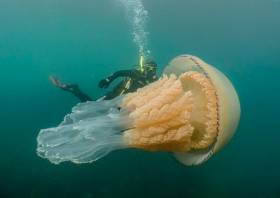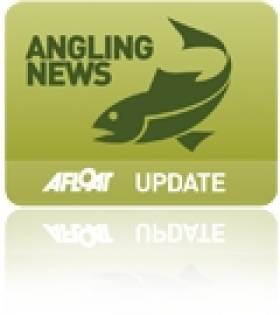Displaying items by tag: octopus
Divers Meet ‘Giant’ Jellyfish Off Cornwall
Divers off the coast of Cornwall captured the remarkable moment when they encountered a ‘giant’ jellyfish the size of a human being.
As the Irish News reports, biologist Lizzie Daly and wildlife cameraman Dan Abbott were filing for the UK’s Wild Ocean Week at the weekend when they came across the barrel jellyfish.
While not rare for a marine wildlife species, Daly says they are more usually “dustbin lid sized” than the enormous specimens Daly and Abbott shared on social media.
Woah!!!!! We went diving in Falmouth yesterday to finish off #WildOceanWeek and came across this GIANT barrel jellyfish! ? What a way to finish off this marine wildlife adventure! ? pic.twitter.com/NNwDelfWyV
— Lizzie Daly (@LizzieRDaly) July 14, 2019
Elsewhere, and going from large to little, TheJournal.ie reports on a potentially lethal encounter an Irishman had with a tiny octopus in Australia.
Tourist John Paul Lennon had been led to believe the minuscule cephalopod he put on his bare arm in the water at Bunaberg, north of Brisbane, was harmless.
But it was actually a blue-ringed octopus, a highly venomous creature whose sting can cause total paralysis.
“It’s been on my mind constantly thinking what could have happened,” he said. “It’s just lucky I didn’t keep it on my arm for the photo.”
An Irish man, who put a blue-ringed octopus on his arm for a photograph, claims he had no idea the animal could kill him. Speaking exclusively to 7NEWS, the 24-year-old says the one that didn’t get away makes for his best fishing tale yet. @ChloeAmandaB #7NEWS pic.twitter.com/qY89sjL53x
— 7NEWS Brisbane (@7NewsBrisbane) July 14, 2019
Catching Your Dinner Off the West Coast
Deep sea fishing is alive and well off the west coast of Ireland, and not only is it a hugely enjoyable sport - just one catch can be enough to feed the whole family.
That's what The Irish Times' Elizabeth Birdthistle discovered in the last of her series on catching your dinner in Ireland.
Birdthistle set out for the waters off Inis Boffin with John Brittain, who has been skippering his angling boat Bluewater for 20 years for the charter fishing season between April and October.
The boat takes up to 12 anglers who are more than eager to pay €70 a head to catch large cod, pollack and mackerel in abundance. Even novices are welcome, as the fee covers all rods, tackle and tuition.
Squid and octopus are also on the cards, as are some larger quarries such as sharks and ray - though these can only be fished in a tag-and-release programme. Smaller catches also get thrown back to propogate.
"The biggest shark caught here weighed 150lbs," writes Birdthistle, "and, as with all sharks caught, Brittain must tread with caution to release the giant hook or else the shark returns to the deep with part of his hand.
"The tagged sharks have been caught as far away as the Grand Banks off Newfoundland and the Cape Verde islands."
The Irish Times has more on the story HERE.

























































